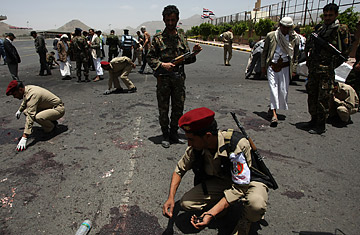
Yemeni military police collect evidence at the site of a suicide-bomb attack in Sana'a, Yemen, on May 21, 2012
Amr Habib stood staring blankly at the pool of blood on the tarmac as paramedics, policemen and forensics officers in white overalls hurried frantically around him. A soldier from Yemen's Central Security Forces, Habib was among those participating in a rehearsal for a military parade on Monday ahead of Yemen's May 22 National Unity celebrations. The drill, watched by the Minister of Defense, was drawing to a close when a dull thud shuddered through the square. A young man dressed in combat fatigues had sneaked into the tightly packed formation of soldiers and detonated explosives strapped to his chest. The blast, captured live on state TV, sent bodies and rifles flying across the square. Panicked soldiers fired their weapons in the air, scattering like sheep. A pile of motionless uniformed bodies lay on the tarmac.
Sana'a is not a stranger to suicide attacks. In April 2010, a young man blew himself up in an unsuccessful attempt on the life of former British ambassador Tim Torlot. But Monday's attack was of a different magnitude. The lone bomber claimed the lives of more than a hundred soldiers. Hospitals in Sana'a struggled to find the floor space, let alone adequate medical supplies, to treat the further 222 people who were injured. It was the single bloodiest incident seen in the capital since the 1994 civil war and a grim reminder of the turmoil this impoverished Arab nation is facing after a year of upheaval that unseated President Ali Abdullah Saleh.
Adjusting the Yemeni flag slung over his shoulder, Habib squatted down and picked up a red beret from the ground. "This was the work of terrorists," he said, turning it over in his hands. "Extremists bent on destroying our nation."
Habib was right. Just hours after the attack, militants affiliated with al-Qaeda in the Arabian Peninsula (AQAP), posted a statement on Facebook claiming responsibility for the carnage. It was retaliation, they said, for an American-assisted government offensive against AQAP strongholds in southern Yemen. "We will take revenge, god-willing, and the flames of war will reach you everywhere," they said. Striking at soldiers from the Central Security Forces, an elite paramilitary unit trained by the U.S. to fight terrorism, the attack was as violent as it was symbolic. Al-Qaeda has made it clear that America is enemy No. 1. An attack by al-Qaeda gunmen on Sunday against three American civilian contractors helping to train Yemen's coast guard in the port city of Hodeidah was the third on U.S. nationals in as many months.
Monday's bloodbath underlined a shift in tactics by the jihadists who are busy trying to transform themselves from a fringe group of militants into a full-fledged domestic insurgency. "A year ago [al-Qaeda] were numbered in the dozens, armed with light weapons and scattered here and there," Jamal Benomar, the U.N. envoy to Yemen, told TIME in Sana'a last week. "Now they are in their thousands with tanks and heavy weapons. For the first time in history, al-Qaeda controls territory."
After pushing out army units and setting up de facto administrations — mini-Islamic fiefdoms — in the south, AQAP, a group the Pentagon claims is the most deadly in the Middle East, is turning its attention to more ambitious pursuits. From the Red Sea coastal plains of Hodeidah to the craggy valleys of the Hadhramaut, AQAP has started dispatching teams to assassinate officials, blow up oil pipelines and kidnap foreigners as a means of financing its insurgency. A Swiss woman, one of two foreign aid workers seized from her car near Hodeidah last month — hundreds of miles from al-Qaeda's southern lairs — is now being held in the southern Shabwa province by AQAP fighters who are demanding $60 million for her release. Last week, the Bulgarian ambassador's SUV was sprayed with bullets by kidnappers he eluded in the capital.
"We're fighting a new animal," says Farid al-Zahar, a professor of politics at Aden University. "AQAP are flexing their muscles, proving they can strike wherever and whenever they want. They started local, now they are sowing chaos nationwide."
Monday's bomb dealt a serious blow to Yemen's fledgling new government headed by President Abd Rabbuh Mansur al-Hadi, who replaced the wily Saleh in the wake of a deal backed by regional powers in February. So far al-Hadi's response to the bomb has been timid. Yemenis were shocked when a speech expected to be delivered by the President offering condolences to the victims of the families on Monday was instead read out by a news anchor. After watching a somber version of the "celebratory" parade on Tuesday from behind a bulletproof shield, al-Hadi issued a threat to al-Qaeda via the state news agency: "The war on terrorism will continue until it is uprooted and annihilated completely, regardless of the sacrifices." Can he deliver on that threat? "Al-Hadi must prove he is bent on fighting terrorism but it is a fight that may already be out of his hands," says Yemen analyst Abdulghani al-Iryani. "The gains that al-Qaeda made during last year's unrest are only just starting to be felt."
